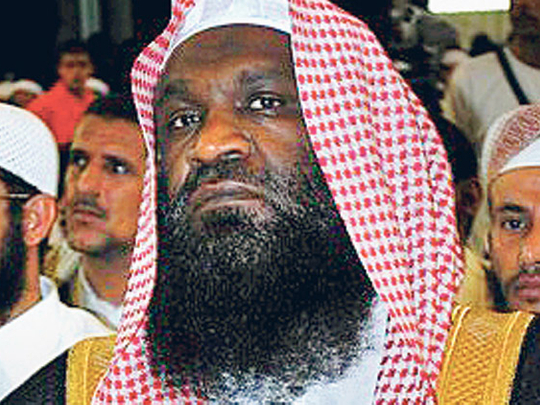
Riyadh: A fatwa (religious ruling) issued by Shaikh Adel Al Kalbani, a former imam of the Grand Mosque in Makkah, in which he claimed that Islam does not forbid singing and music has split Saudi scholars, Islamic thinkers and secularists.
"There is no clear-cut religious ruling that says singing and music are not permissible in Islam," Al Kalbani has said.
His fatwa shocked many of his supporters and students because he was one of the most fanatical scholars during the 1980s who strongly opposed singing and music. People are astonished by this 180 degrees shift in attitude.
A number of Saudi scholars, preachers, men of letters and writers who spoke to Gulf News were divided on the fatwa. Al Kalbani was strongly criticised specially on the internet which many of them said Al Kalbani has exited the Islamic Jamaa (group).
A majority of the Saudi scholars, whether in the official religious establishment or outside it, are unanimous in their stand against singing and music despite the fact that a huge singing opera is presented every year during the National Cultural and Heritage Festival (Janadriya).
Al Kalbani is a son of an emigrant from the UAE who came to Saudi Arabia from Ras Al Khaimah in the 1950s looking for work.
He said in his new fatwa that singing was not against Islam if it was made for entertainment and did not include foul language.
Moderate approach
Al Kalbani, who is nicknamed "Obama of Saudi Arabia" said it is not right to say singing is totally not permissible under Islam and also not right to say it is absolutely forbidden by the religion. "We should always be moderate," he said.
He also approved the Saudi folklore dances such as Al Ardah Al Najdiyah, Al Khibaiti, Al Samri and Al Mizmar Al Hijazi. He cited the rulings issued by imam Al Nawawi and Ibn Katheer permitting folklore dances in social occasions such as wedding and circumcision.
Shaikh Saleh Allihaidan, former chairman of the Supreme Judicial Council and member of the Supreme Council of Senior Saudi Scholars, said Al Kalbani was an imam of a mosque and not a qualified scholar to issue fatwas.
"Al Kalbani should not meddle in fatwas. He should stay in his mosque to lead prayers and recite [the] Quran. He should not put his nose in the issues concerning fatwas," he said.
Shaikh Abdul Aziz Al Fouzan, a renowned Saudi scholar joined Shaikh Allihaidan in his attack against Al Kalbani. "Al Kalbani has made himself a mufti without any Islamic knowledge or piety," he said.
Dr Mohammad Al Hamoud Al Najdi, an Islamic researcher, asked people not to heed Al Kalbani's fatwa permitting singing and music. "How can Al Kalbani go that far while he knows very well that the Muslim leaders and scholars of Saudi Arabia believe that Islam does not permit singing and music?" he questioned.
Al Kalbani himself was against singing and music but he has changed his mind. "I have read the fatwas of those saying singing and music were against Islam.
"I strongly supported them and had a famous sermon on this but I changed my mind when I found out that prohibition of singing and music in Islam was based on weak evidences," he said.
People who love singing and music were quick to support Al Kalbani. Saudi publisher and media personality Osman Al Omair welcomed Al Kalbani's fatwa and said those who say singing and music were haram are as good as animals.
He said in an interview with MBC that the people who do not give much attention to music live like animals. "Music is the sign of civilisation and progress of any society," he said.
Muneef Al Shammari, a writer, said those who permit music do not necessarily approve of the corruption and immorality of the singers. "The scholars who permit music do not approve dancing, nudity and corrupt clips preaching vulgarity and corruption," he said.












